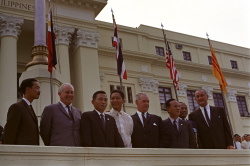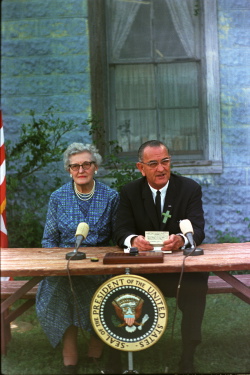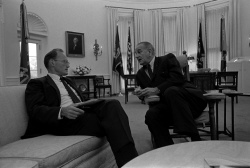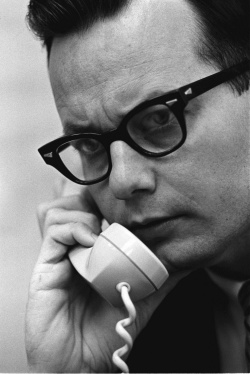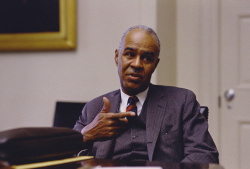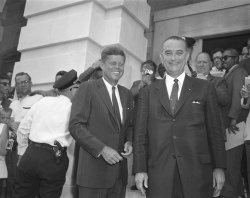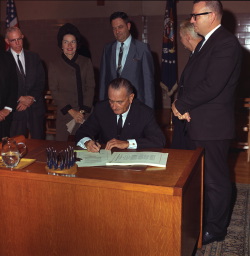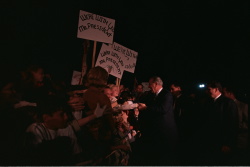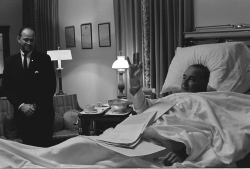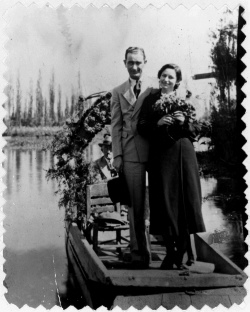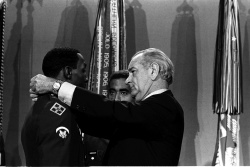1st2nd3rd4th5th6th7th8th9th10th11th12th13th14th15th16th17th18th19th20th21st22nd23rd24th25th26th27th28th29th30th
November 1st
On this day in 1971, Johnson’s memoir, The Vantage Point: Perspectives of the Presidency, 1963-1969, was published.
On this day in 1967, President Johnson met with King Mahendra Bir Bikram Shah Deva of Nepal at the White House. That evening, Charlie Byrd, guitarist, performed at the State Dinner.
November 2nd
On this day in 1966, President Johnson ended his trip to Southeast Asia to attend the Manila Conference.
The day began in Seoul, Korea, where President Johnson addressed the National Assembly of Korea. Then, he flew to Alaska and, upon arrival, made a statement. In his hotel room, the President talked with various staff members, remarking on the extensive legislation on education, health, conservation, and beautification passed during his administration and on the importance of the trip in the search for peace and prosperity in Asia.
On this day in 1964, President Johnson made a campaign speech at Sam Houston Senior High School in Houston, Texas. (In 1931, Johnson was a speech teacher and debate coach at Sam Houston High School.)
“I don't know what is going to happen tomorrow, but I know what I am going to do. I am going to get up early, and I am going down to that Johnson City, Texas, courthouse and I am going to put a vote in for Ralph Yarborough, and I am not going to do it just because I like him or because he is a friend. I am going to do it because I think that he has loyally and effectively worked for the Democratic program for all the people, and I want to be President of all the people.
“You have a precious privilege that many people in many countries don't have. Some of them are fighting for it and many of them would die for it, and a good many have died in order that you might have it.”
November 3rd
On this day in 1966, President Johnson signed the Elementary and Secondary Education Act Amendments (PL 89-750) and the Higher Education Act Amendments (PL 89-752).
The Elementary and Secondary Education Act Amendments (PL 89-750) included:
- A provision that schools could use the national average “per student expenditures” if the national average was higher, a benefit to poorer states
- A new program to aid in the education of handicapped children
- The transfer of adult education activities from the Office of Economic Opportunity to the Office of Education in Health, Education, and Welfare
- The first appropriation of funds for the National Teacher Corps
The Higher Education Act Amendments (PL 89-752) included:
- The authorization of expenditures for undergraduate and graduate facility grants and loans in fiscal 1967-69
- Canceling student loans to teachers of handicapped students
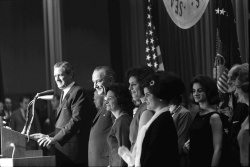 Pres. Lyndon B. Johnson and family, Texas Gov. John Connally, on stage at a celebration of the presidential election results
Pres. Lyndon B. Johnson and family, Texas Gov. John Connally, on stage at a celebration of the presidential election resultscredit: Cecil Stoughton
On this day in 1964, Lyndon Baines Johnson was elected President of the United States with the greatest percentage of the total popular vote (61%) ever attained by a Presidential candidate. Hubert Humphrey was elected Vice President.
On this day in 1964, President Johnson had a telephone conversation with National Security Advisor McGeorge Bundy. The two men discussed the current situation in Vietnam, the effect of the election on future action, and LBJ’s health.
On this day in 1964, President Johnson had a telephone conversation with Special Assistant and White House Press Secretary Bill Moyers.
Moyers gave LBJ a report on election returns, the heavy turnout, the pollster’s analyses, and election results in Kansas, New York, and Georgia. They discussed Robert Kennedy’s Senate race and the heavy Negro turnout in the South.
On this day in 1964, President Johnson had a telephone conversation with Robert Kennedy.
The two men discussed election results in various states and Edward Kennedy’s victory. Robert Kennedy thanked LBJ for his help, and LBJ responded by saying nothing would divide them.
November 4th
 Pres. Lyndon B. Johnson and family, Texas Gov. John Connally, on stage at a celebration of the presidential election results
Pres. Lyndon B. Johnson and family, Texas Gov. John Connally, on stage at a celebration of the presidential election resultscredit: Cecil Stoughton
On this day in 1964, at approximately 1:40 a.m., President Johnson delivered his victory speech after being re-elected.
On this day in 1964, President Johnson had a telephone conversation with former President Harry Truman.
Truman congratulated LBJ on his election victory. LBJ praised Truman, offered him assistance, and invited the Truman family to visit the White House.
On this day in 1964, President Johnson had a telephone conversation with Roy Wilkins, Executive Director of the NAACP.
The two men talked about LBJ’s gall bladder surgery, the appointment of the HUD secretary, and the Negro vote in the elections. LBJ discussed his faith in the electorate, importance of voting rights and voter registration drives, John Connally, and the DC home rule bill.
November 5th
On this day in 1964, President Johnson had a telephone conversation with Dr. Martin Luther King, Jr.
LBJ thanked Dr. King for his support and that of the Negro community in the election. Dr. King congratulated LBJ and expressed optimism about the future. LBJ asked Dr. King to help with the poverty program. The two men also discussed Lady Bird Johnson’s whistlestop campaign.
On this day in 1963, Vice President Johnson attended special ceremonies at the American Military Cemetery at Hamm, Luxembourg, and visited the graves of Gen. George S. Patton and four of the 137 Texas dead.
On this day in 1965, President Johnson signed a Bill authorizing the sale or loan of warships to friendly powers.
“I have today signed H.R. 7812 which authorizes the sale or loan of 11 warships to friendly foreign countries in Europe, South America, and Asia.”
November 6th
On this day in 1960, Johnson was elected Vice President of the United States, and re-elected to his third term in the United States Senate. The Kennedy-Johnson ticket defeated the Nixon-Lodge ticket in one of the closest elections in American history.
On this day in 1965, President Johnson issued Proclamation 3686—Designating a Day of Dedication and Prayer for Those Risking Their Lives for Peace in Viet-Nam.
Now, Therefore, I, LYNDON B. JOHNSON, President of the United States of America, do hereby designate Sunday, November 28, 1965, as a day of dedication and prayer, honoring the men and women of South Viet-Nam, of the United States, and of all other countries, who are risking their lives to bring about a just peace in South Viet-Nam.
November 7th
On this day in 1967, President Johnson signed the Public Broadcasting Act establishing the nonprofit and nongovernmental Corporation for Public Broadcasting. The Corporation for Public Broadcasting provides financial assistance for noncommercial educational television and radio broadcasting.
“This Corporation will assist stations and producers who aim for the best in broadcasting good music, in broadcasting exciting plays, and in broadcasting reports on the whole fascinating range of human activity. It will try to prove that what educates can also be exciting.
“It will get part of its support from our Government. But it will be carefully guarded from Government or from party control. It will be free, and it will be independent—and it will belong to all of our people.
“Television is still a young invention. But we have learned already that it has immense—even revolutionary—power to change, to change our lives.
“I hope that those who lead the Corporation will direct that power toward the great and not the trivial purposes.
“At its best, public television would help make our Nation a replica of the old Greek marketplace, where public affairs took place in view of all the citizens.”
On this day in 1966,President Johnson made remarks at the Welshuen School in Cotulla, Texas.
“I am so happy to be back where these memories are so strong.
“Thirty-eight years have passed, but I still see the faces of the children who sat in my class. I still hear their eager voices speaking Spanish as I came in. I still see their excited eyes speaking friendship.
“Right here I had my first lessons in poverty. I had my first lessons in the high price we pay for poverty and prejudice right here.
“Thirty-eight years later our Nation is still paying that price.
“Three out of every four Mexican-American children now in a Texas school will drop out before they get to the eighth grade.
“One out of every three Mexican-Americans in Texas who are older than 14 have had less than 5 years of school.
“How long can we pay that price?
“In one school district alone, one out of every two children is of Mexican-American descent. But two out of every three graduating seniors this year will be Anglo.
“How long can we pay that kind of a price?
“In five of our Southwestern States, 19 percent of the total population has less than 8 years of school. Almost one-fifth of the population in five States has less than 8 years in school.
“What is the percent of the Mexican-Americans with less than 8 years of school? How many Mexican-Americans have less than 8 years of school? Fifty-three percent. Over half of all the Mexican-American children have less than 8 years of school.
“How long can we pay that price?
“I will give you that answer this afternoon. I will give that answer to America this afternoon. I will say: We can afford to pay that price no longer. No longer can we afford second-class education for children who know that they have a right to be first-class citizens.”
November 8th
On this day in 1965, President Johnson signed The Higher Education Act (PL 89-329) at Southwest Texas State College in San Marcos, Texas. It was the first U.S. Congressional approval for scholarships to undergraduate students.
The Act’s provisions:
- Included insurance on student loans that had been proposed by President Johnson while he was a Congressman
- Transferred the work-study program to the Office of Higher Education
- Created the National Teacher Corps which was designed to improve elementary and secondary education in needy urban and rural areas. Teams consisting of an experienced teacher and several young college graduates were sent in to strengthen local school programs
“Today, then, we embark on a new adventure in learning. And it has a very special meaning to me.
“This is a proud moment in my life. I am proud to have a part in the beginning that this bill provides, because here a great deal began for me some 38 years ago on this campus.
“It was here in these surroundings that I first understood the deeper meaning of the Bible's promise that: "Ye shall know the truth and the truth shall make you free.
“Here the seeds were planted from which grew my firm conviction that for the individual, education is the path to achievement and fulfillment; for the Nation, it is a path to a society that is not only free but civilized; and for the world, it is the path to peace—for it is education that places reason over force.”
On this day in 1967, President Johnson met with Hussein bin Talal, King of Jordan, at the White House.
November 9th
On this day in 1966, President Johnson had a telephone conversation with Vice President Hubert Humphrey.
The two men talked about the Minnesota election. LBJ talked about what he called disappointing election results and the public response to the actions of liberals. They also discussed labor and civil rights leaders.
November 10th
On this day in 1965, President Johnson issued Proclamation 3687: Thanksgiving Day, 1965.
For all the blessings that have been bestowed upon our nation during the past 12 months, it is a small thing to give thanks to Almighty God.
When the pilgrims first observed Thanksgiving nearly 350 years ago, life was harsh and unrelenting. Cold and sickness had diminished their ranks. Their shelter was crude. Their future was uncertain. Yet when their harvest was abundant, they considered themselves blessed—and their hearts were filled with gratitude.
Today we have much more than an abundant harvest. Our nation is rich and strong and united in the cause of liberty and justice. Our physical comforts are unmatched anywhere in the world. Our medicine has conquered ancient diseases.
In the past year we have added greatly to that national legacy. We have guaranteed the right to vote to all our citizens. We have pledged dignity to our elderly—even in sickness. We have added new dimensions to the education of our youth. We have broadened the horizons of opportunity for our poor. And all the while, we have enjoyed the greatest prosperity in history.
But our real blessings lie not in our bounty. They lie in those steadfast principles that the early pilgrims forged for all generations to come: the belief in the essential dignity of man; the restless search for a better world for all; and the courage—as shown by our sons in Viet-Nam today—to defend the cause of freedom wherever on earth it is threatened.
These are the eternal blessings of America. They are the blessings which make us grateful even when the future is uncertain. They are the blessings which give us the strength to complete the unfinished tasks that remain before us.
For these blessings should we thank God most of all.
Now, Therefore, I, Lyndon B. Johnson, President of the United States of America, in consonance with the Joint Resolution of the Congress approved December 26, 1941, 55 Stat. 862 (5 U.S.C. 87b), designating the fourth Thursday of November in each year as Thanksgiving Day, do hereby proclaim Thursday, November 25, 1965, as a day of national Thanksgiving.
On that day, let us gather in our homes and in our places of worship to thank God for His generosity. Let us make ourselves worthy of that generosity by pledging to Him our everlasting devotion. And let us pray to Him that the forces of violence, indifference and intolerance may soon vanish from the face of the earth so that peace and understanding and love may reign supreme.
In Witness Whereof, I have hereunto set my hand and caused the Seal of the United States of America to be affixed.
DONE at the City of Washington this tenth day of November in the year of our Lord nineteen hundred and sixty-five, and of the Independence of the United States of America the one hundred and ninetieth.
November 11th
November 12th
On this day in 1966, President Johnson signed the Food for Peace Act of 1966.
“On February 10, I proposed to the Congress a Food for Freedom program, by which the United States might lead the world in a war against hunger. The act which I have signed today prepares us for this historic task.
“We must be certain that our Food for Freedom grants are consistent with our program to encourage the sound and rapid expansion of food production in the receiving countries. Food for Freedom grants will be made only where the country receiving the grant demonstrates its own willingness to help win its own war on hunger. We must also be certain that Food for Freedom grants are made, whenever possible, on a multilateral basis with the other countries of the world who have the resources to join us in food grant programs. We are all members of the family of man and as such we must band together if we are to be successful in the war on hunger.”
On this day in 1964, President Johnson met with Mexican President-elect Gustavo Diaz-Ordaz at the LBJ Ranch.
November 13th
On this day in 1961, Vice President Johnson hosted a dinner party honoring Mr. and Mrs. Philip Graham, publisher of the Washington Post.
On this day in 1964, President Johnson issued Proclamation 3628: Wright Brothers Day, 1964.
WHEREAS Orville and Wilbur Wright made the first successful flights in a powered aircraft on December 17, 1903, near Kitty Hawk, North Carolina; and
WHEREAS these historic flights-and those that followed-have promoted universal understanding by bringing people closer together; and
WHEREAS the Wright brothers provided the initial spark that has made the United States of America the world leader in civilian and military aviation; and
WHEREAS the Congress, by a joint resolution approved December 17, 1963 (77 Stat. 402), designated the seventeenth day of December of each year as Wright Brothers Day and requested the President to issue annually a proclamation inviting the people of the United States to observe that day with appropriate ceremonies and activities:
NOW, THEREFORE, I, LYNDON B. JOHNSON, President of the United States of America, do hereby call upon the people of this Nation, and their local and national government officials, to observe Wright Brothers Day, December 17, 1964, with appropriate ceremonies and activities, both to recall the accomplishments of the Wright brothers and to provide a stimulus to aviation in this country and throughout the world.
November 14th
On this day in 1967, President Johnson met with Prime Minister Eisaku Sato of Japan at the White House. Tony Bennett performed at the State Dinner that evening.
On this day in 1968, President Johnson made remarks at a Ceremony Commemorating the 20th Anniversary of the National Heart Institute.
“In the 20 years since this Institute was founded, we have amassed more knowledge about the heart and its diseases than mankind gained in all the previous history. We have reduced the death rate from high blood pressure by nearly 50 percent in the last 10 years. We have developed new surgical techniques. We have some of the distinguished surgeons here with us this morning. I am glad to say we have developed heart lung machines; we have developed open heart surgery; and we have made many other breakthroughs.
“Now, we have come a long way, but I know there is not a person in the room or at the Heart Institute or on a medical faculty anywhere who feels that we have come nearly far enough. A family of diseases that still murders more than a million citizens a year cannot be said to be ready for a knockout blow.
“Stand before the American people and argue for the funds that are essential if we are going to make this 20 years better than the last.”
November 15th
On this day in 1967, President Johnson signed the Foreign Assistance Act of 1967.
“This act reaffirms the basic principles which have guided America’s foreign economic policy for two decades. It proclaims our readiness to help those who help themselves in mankind’s unrelenting struggle against poverty, ignorance, and disease.
“Foreign assistance represents our hopes for the world our children will inherit. It gives meaning to the pledges of four Presidents and 10 Congresses that the United States will help to provide the margin of hope that nourishes the poverty-stricken millions around the world for whom change is not a matter of choice but of necessity.
“I regret to say that the Foreign Assistance Act of 1967 reduces the margin of hope to the danger point.
“I respect the judgment of the Congress. But I would be remiss in my duty if I failed to state my own conviction. I believe the money cuts and other restrictions in this act will seriously inhibit this Government’s effort to assure and enlarge the security of the free world. For 20 years we have recognized the link between that security and our own. We should not lose sight of it now.”
On this day in 1966, President Johnson issued a statement following the successful completion of the Gemini space program. This came after the Gemini 12 mission with astronauts James A. Lovell and Edwin E. “Buzz” Aldrin, Jr.
“Today’s flight was the culmination of a great team effort, stretching back to 1961, and directly involving more than 25,000 people in the National Aeronautics and Space Administration, the Department of Defense, and other Government agencies; in the universities and other research centers; and in American industry.
“Early in 1962, John Glenn made his historic orbital flight and America was in space. Now, nearly 5 years later, we have completed Gemini and we know that America is in space to stay.”
November 16th
November 17th
November 18th
On this day in 1965, President Johnson wrote a letter establishing a task force on the impact of the Cuban Refugee Program.
As a result of the refugee program launched in 1961, more than 180,000 refugees have been aided to resettle and integrate in Miami and elsewhere in the United States. Less than 16,000 now require financial assistance in the Miami area. This is a good record of which Americans can be proud. I want our new program to be even better.
On this day in 1968, President Johnson wrote a letter to the President of the Senate and to the Speaker of the House transmitting an assessment of the nation’s water resources.
The report I submit today is part of a national effort to assure that America will not neglect the management of her water resources in the years ahead. It is a sobering report, challenging our technology and spurring our conscience.
The recently authorized National Water Commission will review and advise the Nation on the entire range of its water-resource problems. The assessment prepared by the Water Resources Council will help the Commission in devising more effective water resource policies.
The national assessment I am transmitting is the first attempt at this most difficult problem. It represents the coordinated efforts of many Federal, State and Regional agencies and organizations, working with the Water Resources Council. This assessment identifies several problems requiring priority attention and should serve as a basis for further analysis.
Through such analysis as well as other activity under the Water Resources Planning Act we can continually assess, plan, and develop our water resources in an intelligent and thoughtful manner.
November 19th
November 20th
On this day in 1967, President Johnson signed the Bill creating the National Commission on Product Safety.
November 21st
On this day in 1967, President Johnson signed the Air Quality Act to strengthen federal powers to combat air pollution.
“Today we grow up to our responsibilities. This new Air Quality Act lets us face up to our problem as we have never faced up before.
“In the next 3 years, it will authorize more funds to combat air pollution—more funds in the next 3 years to combat air pollution—than we have spent on this subject in the entire Nation’s history of 180 years.
“It will give us scientific answers to our most baffling problem: how to get the sulphur out of our fuel—and how to keep it out of our air.
“It will give Secretary Gardner new power to stop pollution before it chokes our children and before it strangles our elderly—before it drives us into a hospital bed.
“It will help our States fight pollution in the only practical way—by regional airshed controls—by giving the Federal Government standby power to intervene if and when States rights do not always function efficiently.
“It will help our States to control the number one source of pollution—our automobiles.
“But for all that it will do, the Air Quality Act will never end pollution. It is a law—and not a magic wand to wave that will cleanse our skies. It is a law whose ultimate power and final effectiveness really rests out there with the people of this land—on our seeing the damnation that awaits us if the people do not act responsibly to avoid it and to curb it.
“Last January, in asking Congress to pass this legislation, I had this to say:
“‘This situation does not exist because it was inevitable, nor because it cannot be controlled. Air pollution is the inevitable consequence of neglect. It can be controlled when that neglect is no longer tolerated.
“‘It will be controlled when the people of America, through their elected representatives, demand the right to air that they and their children can breathe without fear.’
“So, let us then strengthen that demand from this moment on. Let us seize the new powers of this new law to end a long, dark night of neglect.”
On this day in 1968, The Alvin Ailey American Dance Theatre and The Howard University Choir performed at the White House in honor of the National Council on the Arts.
November 22nd
On this day in 1963, President John F. Kennedy was assassinated in Dallas, Texas, and Lyndon B. Johnson was sworn into office by Judge Sarah Hughes aboard Air Force One at Love Field in Dallas. Johnson became the thirty-sixth President of the United States.
November 23rd
On this day in 1963, President Johnson met with Attorney General Robert Kennedy, former Presidents Dwight Eisenhower and Harry Truman, and National Security advisors regarding Vietnam.
On this day in 1963, President Johnson accompanied Congressional leaders to view the body of President John F. Kennedy. LBJ issued Proclamation 3561: National Day of Mourning for President Kennedy.
NOW, THEREFORE, I, LYNDON B. JOHNSON, President of the United States of America, do appoint Monday next, November 25, the day of the funeral service of President Kennedy, to be a national day of mourning throughout the United States. I earnestly recommend the people to assemble on that day in their respective places of divine worship, there to bow down in submission to the will of Almighty God, and to pay their homage of love and reverence to the memory of a great and good man. I invite the people of the world who share our grief to join us in this day of mourning and rededication.
November 24th
On this day in 1963, President Johnson walked with the procession from the White House to the Capitol behind the Kennedy cortege.
He returned from the Capitol to the Executive Office Building at 2:30 p.m., and was joined by Secretary of State Dean Rusk, Secretary of Defense Robert McNamara, CIA Director John McCone, U.S. Ambassador to South Vietnam Henry Cabot Lodge, and Undersecretary of State George Ball.
On this day in 1966, President Johnson had a telephone conversation with Vice President Hubert Humphrey. The two men talked about a meeting with congressional leaders. LBJ reviewed the federal budget, spending cuts in school lunch programs and the impacted areas, and the Republicans’ wish to cut Great Society programs.
November 25th
On this day in 1963, President Johnson attended funeral services for President John F. Kennedy at St. Matthew's Cathedral. Later, he received foreign dignitaries at the State Department including Prime Minister Hayato Ikeda of Japan, President Charles de Gaulle of France, and Prime Minister Lester Pearson of Canada.
November 26th
On this day in 1963, President Johnson made remarks on the Alliance for Progress to Representatives of the Countries of Latin America.
“I know from personal experience that the future of this hemisphere, the relations between the United States and Latin America, must be among the highest concerns of my Government.”
November 27th
On this day in 1963, Johnson made his first address to Congress as president. Johnson resolved to continue the work begun under his predecessor and to make the passage of the civil rights bill a monument to Kennedy’s memory.
He asked for the early passage of the bill in order to “eliminate from this Nation every trace of discrimination and oppression that is based upon race or color.”
November 28th
On this day in 1963, President Johnson gave a Thanksgiving Day Address to the Nation.
“All of us have lived through 7 days that none of us will ever forget. We are not given the divine wisdom to answer why this has been, but we are given the human duty of determining what is to be, what is to be for America, for the world, for the cause we lead, for all the hopes that live in our hearts.
“A great leader is dead; a great Nation must move on. Yesterday is not ours to recover, but tomorrow is ours to win or to lose. I am resolved that we shall win the tomorrows before us. So I ask you to join me in that resolve, determined that from this midnight of tragedy, we shall move toward a new American greatness.
“More than any generation before us, we have cause to be thankful, so thankful, on this Thanksgiving Day. Our harvests are bountiful, our factories flourish, our homes are safe, our defenses are secure. We live in peace. The good will of the world pours out for us.”
November 29th
On this day in 1963, President Johnson signed Executive Order 11129 designating facilities in Florida as the John F. Kennedy Space Center.
On this day in 1963, President Johnson appointed a special Commission to investigate the assassination of John F. Kennedy, chaired by Supreme Court Justice Earl Warren.
“The special commission will have before it all evidence uncovered by the Federal Bureau of Investigation and all information available to any agency of the Federal Government.
“The Attorney General of Texas has also offered his cooperation. All Federal agencies and offices are being directed to furnish services and cooperation to the special commission. The commission will also be empowered to conduct any further investigation that it deems desirable.
“The President is instructing the special commission to satisfy itself that the truth is known as far as it can be discovered, and to report its findings and conclusions to him, to the American people, and to the world.”
On this day in 1966, President Johnson issued a statement announcing a cutback in federal spending for the current fiscal year.
“I have ordered a fiscal 1967 budgetary cutback of $5.3 billion in Federal programs.
“With this reduction, we plan to achieve a $3 billion cut in Federal spending for the current fiscal year.”
November 30th
On this day in 1963, President Johnson released (signed on November 29) Executive Order 11130 establishing the Warren Commission to investigate the assassination of President Kennedy.

